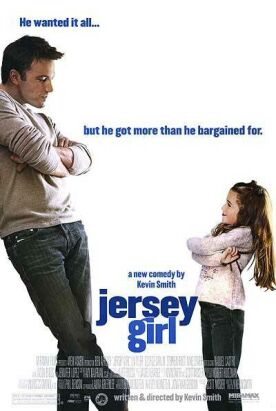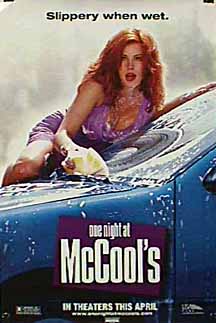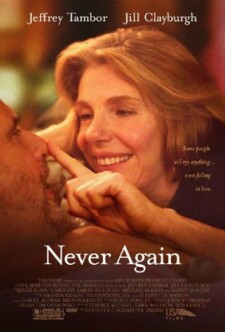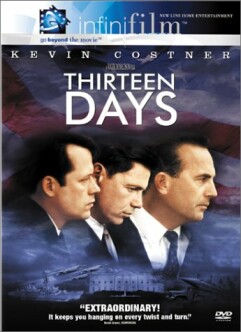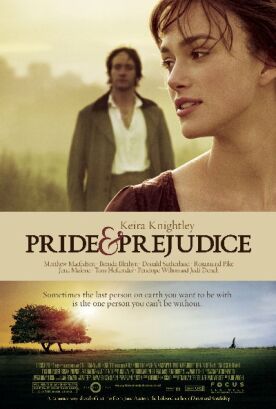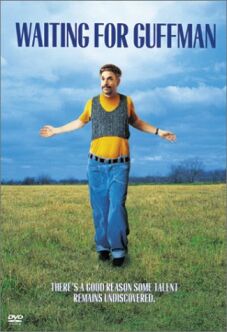Jersey Girl
In retrospect, there was perhaps a little inside joke intended when Kevin Smith’s Jersey Girl portrayed Ben Affleck and Jennifer Lopez as a happily married couple — and then killed off Miss Lopez after fifteen minutes. The “Jersey girl” of the title is presumably the daughter she dies giving birth to, whom her father, Ollie, takes with him to live in the house of his father (George Carlin) in New Jersey. The major part of the film is set when Ben and J-Lo’s child, Gertie (Raquel Castro), is seven and Ollie is finally getting around to thinking about the direction he wants his life to take. Obviously it’s taken him a while, but the persistence of grief is meant to be a testimony to the fineness of his feelings.
And there is a further complication, career-wise. In a moment of exasperation after his wife’s death, while he was attempting to look after a sick baby on his own, he committed the unforgivable sin of a PR man: “trashing the client” to a room full of reporters. Now, he tells Gertie, “the guy who did PR for Hitler had a better chance of working again in this business than daddy does,” so he mopes around small-town Jersey as a municipal employee, like his father.
At this point and more or less simultaneously there come into his life (a) a chance to get back into high-paid PR work, move back to New York City and put Gertie into private school and (b) a new woman. Another Jersey girl.
Or not. Actually, this girl, Maya (Liv Tyler) seems a bit of a rootless cosmopolitan. Though she works in the video store in Ollie’s and Gertie’s town, she is meant to appear a free spirit and apparently has no family there. She is also using her place of employment to help with the research for a thesis she is writing for a women’s studies course about male pornography consumption titled “A Bird in the Hand.” Can you, perhaps, sense that “meet-cute” moment coming up?
“With all due respect to your wife,” Maya tells Ollie when she finds he has been celibate for the past seven years, “you gotta get back on the horse, man” — and duly proposes to mount him herself. “I’m just talking about two consenting adults having some casual sex” — not, that is, marriage or commitment or even love. And yet you would have to be a movie-illiterate not to see from the moment of their meeting that love is eventually going to come into it.
In other words, Kevin Smith wants to eat his cake and have it too. Sex is both the therapeutic and hygienic recreation that Maya first proposes and the pledge of permanency that the movie looks both backward and forward to. Interestingly, he wants to have it both ways with the movie’s larger themes as well. Ollie has to make a self-defining choice between the money and the glamor of a high-stress, high-paying job in the city and the homey authenticity of his life in Jersey, but we have too little sense of any important differences between the two to make the choice comprehensible.
This is a common difficulty in the movies today. Just in the last month or two both Win a Date With Tad Hamilton and Confessions of a Teenage Drama Queen have attempted to revive that venerable Hollywood tradition of contrasting the big city and the small town and affecting, for the sake of the hicks in the sticks, to champion the latter. A couple of years ago they even re-made Frank Capra’s Mr Deeds Goes to Town (1936) with Adam Sandler in the Gary Cooper role as salt-of-the-earth tuba player Longfellow Deeds.
Are you beginning to see the problem?
Nowadays, the ubiquity of the pop culture has left us with no believable points of contrast between town and country. Kate Bosworth’s small town West Virginia girl in Tad Hamilton seems more retarded than innocent; Lindsay Lohan’s Teenage Drama Queen resents it when her mother brings her to small-town New Jersey, but both the people and the opportunities there seem indistinguishable from those in the city.
So it is too in Jersey Girl. Kevin Smith doesn’t spend enough time differentiating his Jersey Eden from the wicked city — maybe because it can’t be done anymore. What the attractions of the former seem to boil down to in the end is the chance to spend more time with Gertie — obviously a desirable thing but not quite enough in itself to place this movie squarely in the archetypal tradition to which it apparently aspires. I say “apparently” because I don’t really believe it does. I don’t really believe that Kevin Smith himself would turn down the chance to make movies in New York or L.A. in favor of driving a street-sweeper and spending more time with the little one in Jersey.
Back in the days when the genre was fresh, Hollywood may also have been hypocritical in championing small-town values, yet the movie makers, who were in most cases quite recently up from the farm themselves, conveyed a palpable longing for the innocence and decency they found in the American hinterland. And they really expected to find it there. Kevin Smith’s Highlands, New Jersey may have poorer paying jobs, beer and boredom going for it, but when the video store clerk offers a “mercy jump” to one of her renters of pornography we know we’re not in Kansas anymore.
Or rather, since the same events could be set in Kansas without anyone’s thinking it odd, we’re not in the same kind of country we were when films like this one made their heart-tugging sense. To pretend that we are, just for the sake of giving his movie a familiar theme, makes Kevin Smith look merely cynical — and contemptuous of his audience.
Discover more from James Bowman
Subscribe to get the latest posts to your email.

